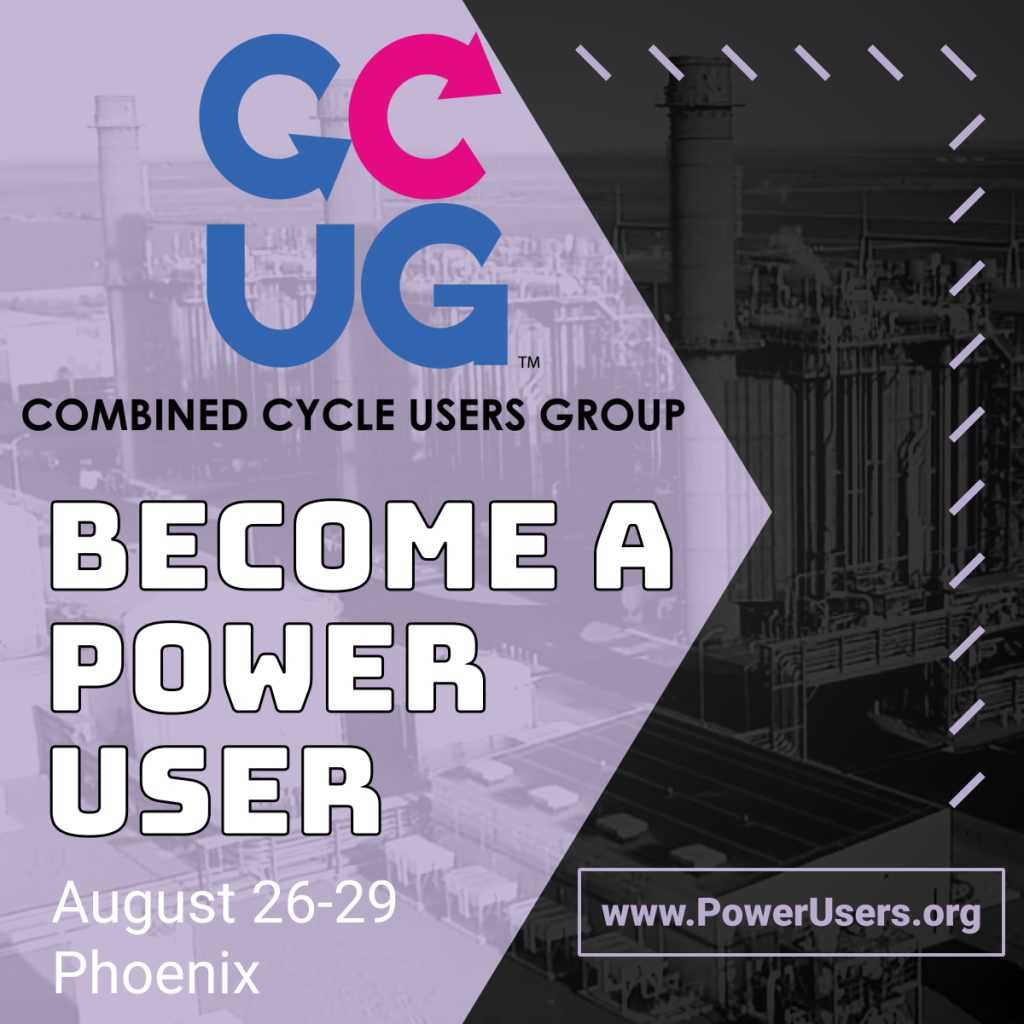The Combined Cycle Users Group’s 2024 conference, a major component of Power Users’ end-of-summer meeting portfolio, is now but two months away with the early-bird registration discount terminating in only a month. Consider reserving your seat now at this premier event for gas-turbine owner/operators at www.PowerUsers.org.
CCUG is one of five user groups (also, Generator, Steam Turbine, Power Plant Controls, and Low Carbon) conducting their annual meetings at the Arizona Grand Resort, in Phoenix, August 26–29. Important: The registration fee allows your participation in any user group’s sessions throughout the conference. More important: Each group has its own 3.5 day agenda to guarantee a fruitful learning experience.
Another plus for attendees: All conferences associated with Power Users now offer PDH certificates to help fulfil PE continuing education and/or company training requirements.
The five groups share the vendor fair on Tuesday and Wednesday, August 27 and 28, and the Wednesday evening off-site event sponsored by Diamond Sponsors GE Vernova, MD&A, and Rexroth (a Bosch company).
This year’s program, still in development by one of the industry’s most experienced steering committees (sidebar), will include the following:
- Professional development—Lube oil and lube-oil testing.
- Hot topics—Ammonia system issues (AIG cleaning and tuning), motors/breakers and relays, cold/hot-weather operations, corrosion under insulation, safety-valve testing, vibration analysis and monitoring, powerplant life extension.
- Lessons learned and roundtable discussions—Weather preparedness, improving reliability by way of pre-start checks, forced outages and how to prevent them, results of short cuts for short-term gains.
- Safety discussion topics—JSA/hazard analysis and qualified electrical workers, accident investigations and what to do when OSHA arrives.
Program updates will be posted to www.PowerUsers.org as they become available.
Value proposition. Perhaps the most objective way to illustrate the value of CCUG annual meetings is to review highlights from previous conferences and reflect on the positive impacts they have had on plant operations and maintenance industry-wide. Example: Two broad themes from the 2023 conference were:
- How aging plants adapt to changing, sometimes radically different, operating missions.
- Continuing issues with supply chains—both labor and material—especially in terms of quality of work.
For more than a decade, combined-cycle plants have been following wind and solar with greater load cycling and more starts and stops. Today, many of those plants are cycling more frequently for even shorter periods with as much capacity as they can muster. One reason: The well-worn “duck curve” has become a “canyon,” referring to the changes in dispatch curves where more gas capacity is “in the money” during daytime hours (the canyon floor) compared to five years ago.
But if three of the facilities highlighted in the user-driven presentations last year are representative, some plants are having to adapt to radically changing missions, like being scheduled for shutdown in a few years, but then suddenly being called upon to run for years more—if not one or two decades. This presents obvious challenges in many areas, including safety, obsolescence, staff knowledge, and others.
Even many of the highly efficient H-class machines installed over the last five years or so are not running baseload and are “cycling all over the place,” said an OEM rep who also noted that earlier model gas turbines expected to be retired in 2045 are now having to plan on operating another 20 years.
Engaging with your colleagues in Phoenix two months hence may well provide the best value for your training/travel dollar. You’ll get the details on emerging trends and operational experience first hand from industry leaders in the trenches dealing with challenges you may face in the months ahead.
Supply-chain issues and quality of work continue to dominate discussions at many industry forums. There was a time, when competitive power supply emerged as a counter to regulated-rate-of-return utilities, that industry soothsayers predicted OEMs and/or contract service providers would be responsible for the major plant subsystems—such as the gas turbine, steam turbine, HRSG—while onsite staff was reduced. Although this has been a major trend over the last two decades, it may have run its course.
Several presentations made last year suggest that owner/operators are reasserting responsibilities for onsite work, or at least acknowledging that OEMs and contractors require much greater oversight. Other speakers noted that equipment commissioned recently is failing prematurely, or exhibiting unexpected downtime and repair needs.
A seasoned expert from a major owner/operator reported on implementing a broad fleet-centric borescope inspection strategy for its turbines to respond to “narrow grid margins and cost pressure on “lower priority units.”
A steam-turbine expert for a large fleet of machines concluded that two D11s of similar vintage can exhibit vastly different first- and second-major outage characteristics. Somewhat surprisingly, the unit with 1000 starts and more than 20 years of service required few repairs, while the one with 70+ starts and eight years of operation required significant repairs during its first major. The two units were procured around the same time but one remained in long-term storage for seven years.
In one session on NERC compliance, there appeared to be audience consensus around the statement, “don’t trust the equipment OEM or the control system OEM to do any of this [verify models, capabilities, data, etc] for you.” An expert in a session on severe-service valves noted “make sure your vendor has QA/QC processes you can refer to after the fact.” A presenter on a BOP subsystem replacement noted “major communication issues,” referring to a non-responsive vendor.
Some of the comments in a “generator quality roundtable” echoed these sentiments:
- Experience has dropped over the last decade across the industry.
- One-third of events in 2022 are accounted for by quality issues.
- Cannot rely on contractors: Owners must force accountability.
- Be wary of vendors “preferred by management” which may not be best for the job at hand.
Finally, the conference presented its traditional share of deep discussions in broad areas affecting all plants all the time—like safety and lock-out/tag-out (LOTO), hot and cold weather ops, and regulatory compliance. Plus, unique equipment events and failures which may seem like “one-offs” but offer warnings, guidance, and lessons learned that often can be broadly applied in similar or other situations.
Register today and join your colleagues in Phoenix to continue these discussions and others to gain perspective on current and future issues impacting personnel safety and your plant’s bottom line.
CCUG steering committee, 2024
Brian Fretwell, director of mechanical services, Calpine Corp
Phyllis Gassert, director, asset management, Talen Energy
Steven Hilger, PE, plant manager, Dogwood Energy Facility, NAES Corp
Jason Jauregui, production team lead, Woodbridge Energy Center, CAMS
Aaron Kitzmiller, plant engineer, Fayett Power Plant, Luminant
Robert Mash, plant manager, River Road Generating Plant, GE Power Services
Jonathan Miller, maintenance manager, Arcadia Power Station, CLECO
Marih Salvat de Jesus, operations manager, Tenaska Virginia Generating Station, Tenaska
Ben Stanley, VP operations, Diamond Generating Corp.




